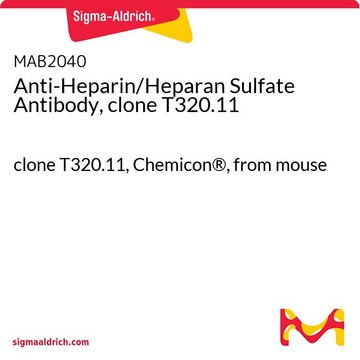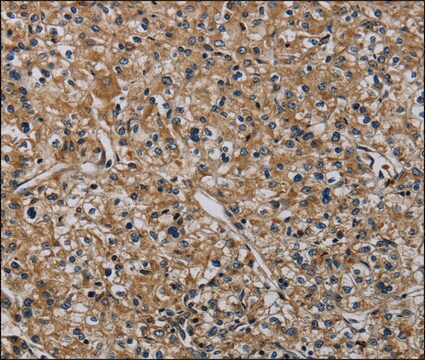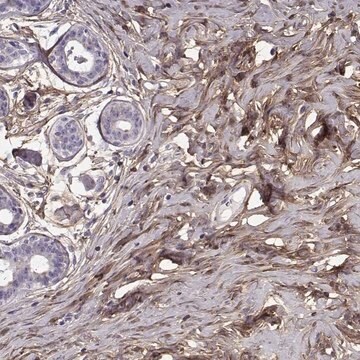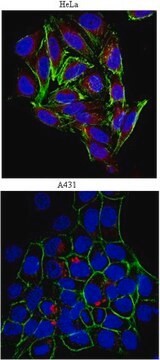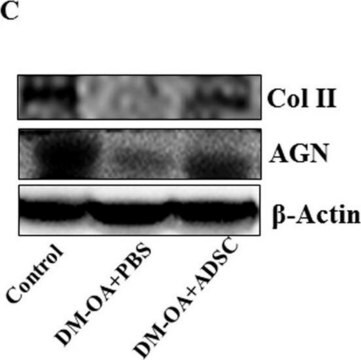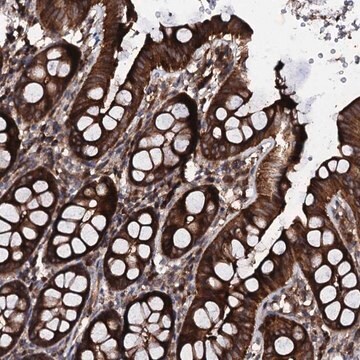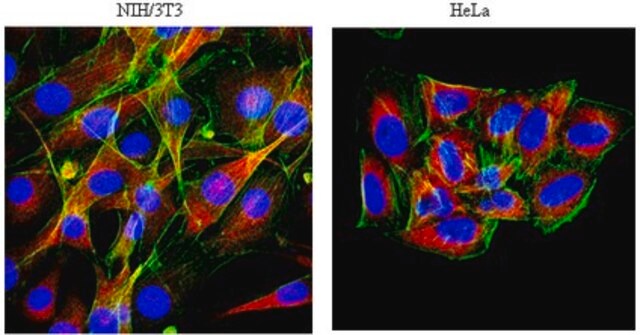모든 사진(1)
About This Item
UNSPSC 코드:
12352203
NACRES:
NA.41
결합:
unconjugated
application:
EM
FACS
IF
WB
FACS
IF
WB
클론:
780-3, monoclonal
종 반응성:
human
citations:
기술:
electron microscopy: suitable
flow cytometry: suitable
immunofluorescence: suitable
western blot: suitable
flow cytometry: suitable
immunofluorescence: suitable
western blot: suitable
추천 제품
생물학적 소스
mouse
Quality Level
결합
unconjugated
항체 형태
purified antibody
항체 생산 유형
primary antibodies
클론
780-3, monoclonal
종 반응성
human
포장
antibody small pack of 100 μg
기술
electron microscopy: suitable
flow cytometry: suitable
immunofluorescence: suitable
western blot: suitable
동형
IgMκ
에피토프 서열
Unknown
단백질 ID 수납 번호
Unknown
배송 상태
dry ice
타겟 번역 후 변형
unmodified
일반 설명
Most eukaryotic genes are expressed as pre-mRNAs that are converted to mRNA by splicing. In this process noncoding sequences (introns) are removed, and coding sequences (exons) are ligated together. Some exons are known to be constitutively spliced and are present in every mRNA produced from a given pre-mRNA. However, many are alternatively spliced to generate variable forms of mRNA from a single pre-mRNA species. Nuclear pre-mRNA splicing is catalyzed by the spliceosome that is a multi-megadalton ribonucleoprotein (RNP) complex. It removes introns from nuclear pre-mRNA. The conformation and composition of spliceosome is shown to be dynamic, which is critical for its high degree of accuracy and flexibility. In most eukaryotes two unique spliceosomes have been described: the U2 -dependent spliceosome that catalyzes the removal of U2-type of introns and the U12-dependent spliceosome that is present only in a subset of eukaryotes and splices U12-type of intron. Introns are removed by two consecutive transesterification reactions. In the first reaction the 2 OH group of the branch adenosine of the intron carries out a nucleophilic attack on the 5 ss, which results in cleavage at this site and ligation of the 5 end of the intron to the branch adenosine, forming a lariat structure. In the second reaction, the 3 ss is attacked by the 3 OH group of the 5 exon, which leads to the ligation of the 5 and 3 exons forming the mRNA, and release of the intron. (Ref.: Matera, AG., and Wang, Z. (2014). Nat. Rev. Mol. Cell Biol. 15(2); 108-121; Will, CL., and Luhrmann, R. (2011). Cold Spring Harb. Perspect. Biol. 3(7); a003707; Patel, AA., and Steitz, JA. (2003). Nat. Rev. Mol. Cell Biol. 4(12); 960-970).
특이성
Clone 780-3 is a mouse monoclonal antibody that detects human Nuclear spliceosomes.
면역원
Nuclear preparation from U266 human myeloma cells.
애플리케이션
Quality Control Testing
Evaluated by Flow Cytometry in permeabilized HeLa cells.
Flow Cytometry Analysis: 2 μg of this antibody detected Nuclear Spliceosomes in one million permeabilized HeLa cells.
Tested Applications
Flow Cytometry Analysis: A representative lot detected Nuclear Spliceosomes in Flow Cytometry applications (Clevenger, C.V., et al. (1985). Cytometry. 6(3): 208-14; Bauer, K.D., et al. (1986). Cancer Res. 46(5): 2428-34; Clevenger, C.V., et al. (1987). Cytometry. 8(3): 280-6).
Immunofluorescence Analysis: A representative lot detected Nuclear Spliceosomes in Immunofluorescence applications (Clevenger, C.V., et al. (1984). J Histochem Cytochem. 32(7): 757-65; Clevenger, C.V., et al. (1985). Cytometry. 6(3): 208-14; Bauer, K.D., et al. (1986). Cancer Res. 46(5): 2428-34; Clevenger, C.V., et al. (1987). Cytometry. 8(3):280-6; Clevenger, C.V., et al. (1987). Cytometry. 8(3): 280-6).
Western Blotting Analysis: A representative lot detected Nuclear Spliceosomes in Western Blotting applications (Clevenger, C.V., et al. (1987). Cytometry. 8(3): 280-6; Kumar, P., et al. (2012). PLoS One. 7(8): e42712).
Electron Microscopy: A representative lot detected Nuclear Spliceosomes in Electron Microscopy applications (Clevenger, C.V., et al. (1984). J Histochem Cytochem. 32(7): 757-65; Bauer, K.D., et al. (1986). Cancer Res. 46(5): 2428-34; Clevenger, C.V., et al. (1987). Cytometry. 8(3): 280-6).
Note: Actual optimal working dilutions must be determined by end user as specimens, and experimental conditions may vary with the end user
Evaluated by Flow Cytometry in permeabilized HeLa cells.
Flow Cytometry Analysis: 2 μg of this antibody detected Nuclear Spliceosomes in one million permeabilized HeLa cells.
Tested Applications
Flow Cytometry Analysis: A representative lot detected Nuclear Spliceosomes in Flow Cytometry applications (Clevenger, C.V., et al. (1985). Cytometry. 6(3): 208-14; Bauer, K.D., et al. (1986). Cancer Res. 46(5): 2428-34; Clevenger, C.V., et al. (1987). Cytometry. 8(3): 280-6).
Immunofluorescence Analysis: A representative lot detected Nuclear Spliceosomes in Immunofluorescence applications (Clevenger, C.V., et al. (1984). J Histochem Cytochem. 32(7): 757-65; Clevenger, C.V., et al. (1985). Cytometry. 6(3): 208-14; Bauer, K.D., et al. (1986). Cancer Res. 46(5): 2428-34; Clevenger, C.V., et al. (1987). Cytometry. 8(3):280-6; Clevenger, C.V., et al. (1987). Cytometry. 8(3): 280-6).
Western Blotting Analysis: A representative lot detected Nuclear Spliceosomes in Western Blotting applications (Clevenger, C.V., et al. (1987). Cytometry. 8(3): 280-6; Kumar, P., et al. (2012). PLoS One. 7(8): e42712).
Electron Microscopy: A representative lot detected Nuclear Spliceosomes in Electron Microscopy applications (Clevenger, C.V., et al. (1984). J Histochem Cytochem. 32(7): 757-65; Bauer, K.D., et al. (1986). Cancer Res. 46(5): 2428-34; Clevenger, C.V., et al. (1987). Cytometry. 8(3): 280-6).
Note: Actual optimal working dilutions must be determined by end user as specimens, and experimental conditions may vary with the end user
Anti-Nuclear Spliceosomes, clone 780-3, Cat. No. MAB1286-I, is a mouse monoclonal antibody that detects Nuclear spliceosomes and is tested for use in Electron Microscopy, Flow Cytometry, Immunofluorescence, and Western Blotting.
물리적 형태
Purified mouse monoclonal antibody IgM in PBS without preservatives.
저장 및 안정성
Store at -10°C to -25°C. Handling Recommendations: Upon receipt and prior to removing the cap, centrifuge the vial and gently mix the solution. Aliquot into microcentrifuge tubes and store at -20°C. Avoid repeated freeze/thaw cycles, which may damage IgG and affect product performance.
기타 정보
Concentration: Please refer to the Certificate of Analysis for the lot-specific concentration.
면책조항
Unless otherwise stated in our catalog or other company documentation accompanying the product(s), our products are intended for research use only and are not to be used for any other purpose, which includes but is not limited to, unauthorized commercial uses, in vitro diagnostic uses, ex vivo or in vivo therapeutic uses or any type of consumption or application to humans or animals.
적합한 제품을 찾을 수 없으신가요?
당사의 제품 선택기 도구.을(를) 시도해 보세요.
Storage Class Code
12 - Non Combustible Liquids
WGK
WGK 2
Flash Point (°F)
Not applicable
Flash Point (°C)
Not applicable
시험 성적서(COA)
제품의 로트/배치 번호를 입력하여 시험 성적서(COA)을 검색하십시오. 로트 및 배치 번호는 제품 라벨에 있는 ‘로트’ 또는 ‘배치’라는 용어 뒤에서 찾을 수 있습니다.
자사의 과학자팀은 생명 과학, 재료 과학, 화학 합성, 크로마토그래피, 분석 및 기타 많은 영역을 포함한 모든 과학 분야에 경험이 있습니다..
고객지원팀으로 연락바랍니다.